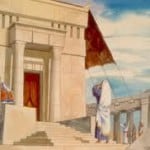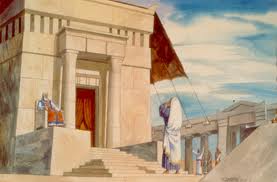Rabbi Chanan Morisson

The Torah portion of Tazria begins with the special offerings of women who recently gave birth. Amazingly, it was over these birth-offerings that a family of priests was disqualified from serving in the Temple. Even worse: according to the Talmud in Yoma 9a, this sorry affair led to the destruction of the Shiloh Tabernacle, the forerunner to the Temple, after functioning for 369 years.
The Sin of Eli’s Sons
The book of Samuel describes the ignominious state of the holy service in the Shiloh Tabernacle. The sons of Eli were insensitive priests who would take their portions by force and “treated God’s offerings with contempt” (I Sam. II:17). Their worst sin, according to the reports reaching the ears of their father, was that “they slept with the women who streamed to the entrance of the Tent of Meeting” (v. 22).
The Talmud states, however, that this verse should not be taken literally. “Anyone who says the sons of Eli actually sinned is mistaken” (Shabbat 55b). So what does it mean that “they slept with the women”? According to the Sages, they failed to offer the birth-offerings of the women promptly, and thus indirectly prevented them from returning home. The women did not trust the priests to bring their offerings, so they would remain in Shiloh until they saw with their own eyes that their offering was completed. Since the inattentive service of Eli’s sons caused the women to be unnecessarily separated from their husbands, the verse refers to their irresponsible behavior as if they slept with them.
Is this just a case of Talmudic whitewash, a rabbinic cover-up? Why should this be the cause for the destruction of the Tabernacle?
The Purpose of the Temple Service
If we want to analyze what brought about the fall of the Tabernacle in Shiloh, we should not give too much weight to passing incidents, grave though they may be. Rather we should search for indications of an underlying moral decay that undermined the very foundations of the Temple service and its objectives.
The Divine service is integrally connected with the concept of uplifting and sanctifying life. We cannot fully elevate life in all of its aspects, in its heights and depths, unless we are able to connect life to its Source, to the Creator of all life.
Life also includes times of trouble and distress. What will give it light, restoring its natural happiness and joy? What will rejuvenate it and grant it nobility and grace? This can only be accomplished by uncovering the Godliness to be found in all aspects of life.
The Birth-Offering
The birth of a child is a wonderful occasion, bringing new life and joy to the family. But the birthing experience is a challenging one, as it also involves pain and suffering. The complex emotions felt by the woman giving birth can bring stress and conflict to the family, and are only forgotten with the passage of time, as life returns to its usual joy and happiness.
What can cleanse the dark impressions and hard feelings that come from this suffering, rooted in the sin of our mother in the beginnings of humanity? Their remedy requires an act of drawing near to God. As the new mother elevates her birthing experience with her chatat and olah offerings, she rectifies the shortcomings caused by the rebellious tendencies of the human heart. These offerings allow her soul to be lifted up in feelings of love for the greatness of the Creator of all life, the Source of love for all creatures.
In short: the Temple offerings must reflect a harmony between the Divine service and the goal of elevating life. This is especially true for the offerings brought after giving birth. True morality cannot sanction the idea of a mechanical Temple service, disconnected from the people and their lives.
The Service in Shiloh
The unfeeling, even tyrannical atmosphere that existed in the Shiloh Tabernacle — the absence of ethical sensitivity, the lack of integrity and compassion, the disconnect from the needs and feelings of the people, by an order of hardhearted priests who paraded their elevated position over the people by force — this spirit created an artificial divide between the principles of morality and the Temple service, and in the end destroyed the reign of the priestly family of Eli. These callous priests saw no connection between their service and the sanctification of life. Ultimately, their actions brought about the fall of the Tabernacle in Shiloh.
The priests should have seen the birth-offering as a vehicle to rectify and purify life. How could they delay these offerings, thus impairing their primary purpose, that which God desires in His world — “shalom bayit” — harmony and quietude in family life?
But Eli’s sons mistakenly viewed their priesthood as an entitlement. Instead of a service based on purity and holiness, theirs was a service capable of arrogance and ugliness. They only sought to fulfill the external, technical side of the Temple service.
This corrupted form of service is what led to the destruction of the Tabernacle — something that an individual sinful act could not cause. If Eli’s sons had actually sinned as written, such a state could not have gone on for long without correction. The service in Shiloh did not suffer from any particular sinful act, but rather from a moral decay in its very foundations, for which it needed to be destroyed in order to be corrected and rebuilt.
(adapted from Ein Eyah vol. IV pp. 49-50)
